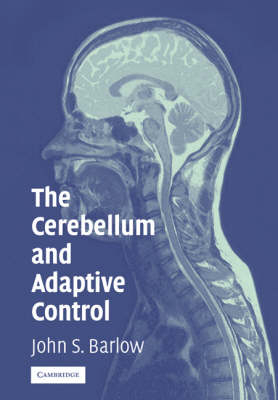
The Cerebellum and Adaptive Control
Cambridge University Press (Verlag)
978-0-521-01807-4 (ISBN)
How the cerebellum accomplishes its highly complex feats of coordination has been the subject of much inquiry; one of the pre-eminent theories places adaptive control at the forefront. This book reinforces the view that the cerebellum functions as an adaptive control system; that is, it automatically adjusts its output as needed for such eventualities as temporary or lasting weakness of muscle. It is the first text to synthesize the substantial body of literature on the subject, combining the neuroscience of the cerebellum with the science of control theory common to electrical and computer engineers. Organized in four parts, the book examines cerebellar anatomy and physiology; cerebellar function; models and theories; and ends with a summary and conclusions. The author's clinical perspective offers a broader view of cerebellar function beyond the basic neuroscience. An appendix demonstrates evidence supporting the adaptive control model from a detailed comparison of the cerebellum with an adaptive signal processor of the author's design and construction.
Preface; Part I. Anatomy and Physiology: 1. Introduction; 2. Some aspects of comparative anatomy of the cerebellum; 3. Aspects of the anatomy and physiology of the cerebellar cortex; 4. The mossy fiber afferent system; 5. The inferior olivary system and the climbing fibers; 6. The cerebellar nuclei and their efferent pathways; aspects of voluntary motor learning; Part II. Function: 7. Cerebellar memory, long-term depression (LTD), and long-term potentiation (LTP); 8. The vestibulocerebellum and the oculomotor system; 9. The cerebellum and cognition; 10. Timing functions, classical conditioning, and instrumental conditioning; 11. Some aspects of cerebellar pathology in humans and animals; genetic alterations; 12. Specialized cerebellum-like structures; Part III. Models and Theories: 13. Non-adaptive models, forerunners of adaptive models, and earlier adaptive control models; 14. Neural networks and adaptive control; neural network models; 15. Some specific features of adaptive controllers and adaptive signal processors; 16. Adaptive control models; Part IV. Summary and Conclusions: 17. The cerebellum as an adaptive controller; Appendix; Author's note; Bibliography; Index.
| Erscheint lt. Verlag | 22.8.2005 |
|---|---|
| Zusatzinfo | 3 Halftones, unspecified; 133 Line drawings, unspecified |
| Verlagsort | Cambridge |
| Sprache | englisch |
| Maße | 180 x 252 mm |
| Gewicht | 831 g |
| Themenwelt | Studium ► 1. Studienabschnitt (Vorklinik) ► Physiologie |
| Naturwissenschaften ► Biologie ► Humanbiologie | |
| Naturwissenschaften ► Biologie ► Zoologie | |
| ISBN-10 | 0-521-01807-2 / 0521018072 |
| ISBN-13 | 978-0-521-01807-4 / 9780521018074 |
| Zustand | Neuware |
| Haben Sie eine Frage zum Produkt? |
aus dem Bereich


